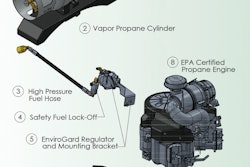
There are several qualities or traits that leaders possess which can impact their success while influencing those around them. Here are a few key attributes to look for in a great leader or develop in yourself to take the lead.
Living example of core values - A company may incorporate into its mission statement that theirs is one of honesty and integrity. However, employees must witness the leadership and ownership practicing these values and must be developed into honest and forthright employees, or that company won’t fulfil its mission. When it comes to core values, it is more important to show people who you are and to exemplify what the company’s beliefs are than it is to talk about it. Although, communicating your values and looking for opportunities to share your value statement are certainly important.
A visionary - Has a strong desire to succeed and help others as well as the company to succeed. Leaders see opportunities and threats coming and take action to capitalize or protect business, family, community, country and/or world.
Communicates well - Sharing your vision, goals and thoughts while actively soliciting feedback and input from those around you. The best communication is dialogue and not monologue. A great communicator takes advantage of timing and communicates at the right time.
Breaks it down - Great leaders know how to take large dreams, visions and projects and then break them down into manageable bite-sized pieces. Taking small steps to finish a large objective helps the individual tasked with the job to understand the process and execute it more easily in the future.
Seeks self-development - While developing others, it is imperative to recognize the importance of looking for opportunities to help yourself grow. Seek to become better daily.
Motivates - Motivation is important for your success both personally and professionally. Read a lot of books, watch a lot of motivational videos, and follow other leaders who possess similar core values. Avoid de-motivational materials, people, conversations and activities.
Multi-tasks effectively - Leaders have the ability to multi-task while focusing on each individual project and/or person and then devote their focus, effort and time to them. The type of person who possesses this skill can do no more than two things at a time and do them well.
Manages time well - Time management is an extremely important skill to understand. Prioritizing and being able to say “No” are key factors. Understanding processes and knowing how to accurately estimate time of activities is an important step towards good time management. Additionally, when it comes to priorities, it is important to start with the opportunity that will have the biggest impact in achieving your goal or goals.
Follows up and follows through - Develop a system to retain information for future opportunities and or follow-ups with your staff, customers, family, friends, etc. Once information has been retained, you have to physically do something with that information. The best plans fail because of lack of implementation.
Approachable and visible - A leader is not only approachable but visible to those who follow them, thus distinguishing them as leader and not just a boss. While there are certainly needs that warrant closed-door planning sessions, they should be the exception and not the rule.
Attitude of Gratitude - Be thankful and share your thankfulness with your team and your customers. In conjunction with humility, thankfulness is a powerful trait that many great leaders possess.
Trustworthy - This person can be counted on and is worthy of trust both professionally and personally. They tell the truth and don’t manipulate words or withhold truth in order to get what they want.
Empowers others - True potential can’t be obtained by micro-managing people. Policies, procedures and guidelines certainly have their place and setting expectations are extremely important. However, it is impossible to write policies for every possible scenario particularly in this ever-changing world. Staff should be empowered to do their job and take care of the customer. If a situation is handled wrong, make suggestions for how to handle it better next time. If done well, praise a job well done.
Read Leadership Development Part 1: Development Versus Training.





















